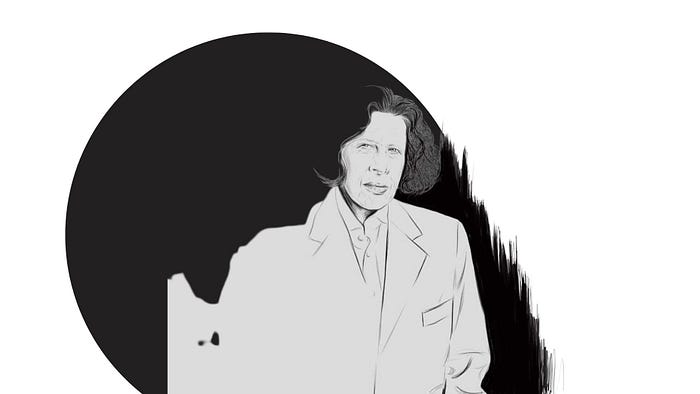

The Duty of Intellectuals
source link: https://medium.com/@rcwaldun/the-duty-of-intellectuals-572ba1924959
Go to the source link to view the article. You can view the picture content, updated content and better typesetting reading experience. If the link is broken, please click the button below to view the snapshot at that time.
The Duty of Intellectuals
It’s way more than just academia

Artwork by Ukrainian artist: Kate Gorbenko
After the tragic death of Toni Morrison in August 2019, the New York writer/social critic Fran Lebowitz found herself in her apartment alone during the pandemic, unable to process the world. For years, she’d always call Toni whenever she struggled to make sense of things.
“When this virus happened,” said Lebowitz during an interview with Sam Fragoso in 2020, “I didn’t know how to think about it. And that was the thing that I most wanted to ask her.” Now that she’s gone, Lebowitz could do nothing more than to take on the world one day at a time without a voice of guidance.
A Sick Society
Two years after Toni’s death, I found myself wandering down Collins Street and I spotted a businessman smoking a cigarette on the sidewalk with a loose collar. Right before I had a chance to process it, another lady walked down the street while stuffing herself with a McDonald’s burger over sips of diet coke. Then, I looked across the crossroad and spotted a teenager, chattering away while he vaped out of a tube.
Something hit me, and it was a darker conclusion. Our society is profoundly sick because people don’t know how to process the world around them. Even worse, they’re left wandering around without any kind of guidance. In theological terms, it was as if God had abandoned us indefinitely, and we were left to our own devices to figure it all out.
The Doctor of Humanity
I once had a conversation with a philosophy professor, Dr. Glenn, after a public lecture, and I asked him why he decided to teach philosophy. He paused for a second and then chuckled: “because in twenty years,” he said, “people would have to load philosophers on ambulances, going around the city to rescue people from their existential crises.”
I think his analogy of viewing philosophers as doctors is not an accident. After all, the Latin root for doctor is docere, meaning to teach or to profess from the position of being a scholar. Modern medical doctors can only cure the symptoms of the illness but have no idea where the source of the illness is. Whereas thinkers and scholars are presented with the duty of conceptualizing the source of society’s deepest ailments.
Modern academia had poisoned us into treating philosophy as books of dense concepts and ideas without no practical applications. Cracking open a philosophy book is like studying mathematics in a disinterested way, but it wasn’t always like this.
Studia Humanitatis and The Renaissance
During the Italian Renaissance, the tradition of Studia Humanitatis actually placed the study of theology and philosophy above the study of the sciences and mathematics. The humanities were placed in higher regard because they directly impacted how people lived their lives. Theorizing about God and reality held grave importance because it gave people a sense of guidance. It was treated as a life-or-death situation.
But now, the humanities are viewed as something trivial, and at best, a disinterested pastime. “The knowledge of good literature,” wrote Russell in The Conquest of Happiness, “which was universal among educated people fifty or a hundred years ago, is now confined to a few professors.” And when the professors set out to teach the books, the urgency of ethics and morality is lost. Ideas remain ideas behind closed doors.
The Duty of the Modern Thinker
As the funding for the humanities is slowly receding, perhaps, we need to remind ourselves of the duty of thinkers.
If you’re lucky enough to have a deep obsession with the humanities, it’s your duty to apply that spirit of inquiry to modern problems. To revitalize the humanities, we must use literature, philosophy, and history as tools to help us navigate the world through whatever means necessary.
In that sense, to pursue a doctoral degree in the humanities, then, is a process of training a thinker to be a doctor of humanity at large, not just someone who cures momentary ailments. And when a professor sets out to teach the concepts, it must carry the same urgency, same ethical spirit, the nobility, and moral charge. The sciences might teach us what is the case, but the humanities at large are the only pursuits that can give us a voice of guidance.
Recommend
About Joyk
Aggregate valuable and interesting links.
Joyk means Joy of geeK